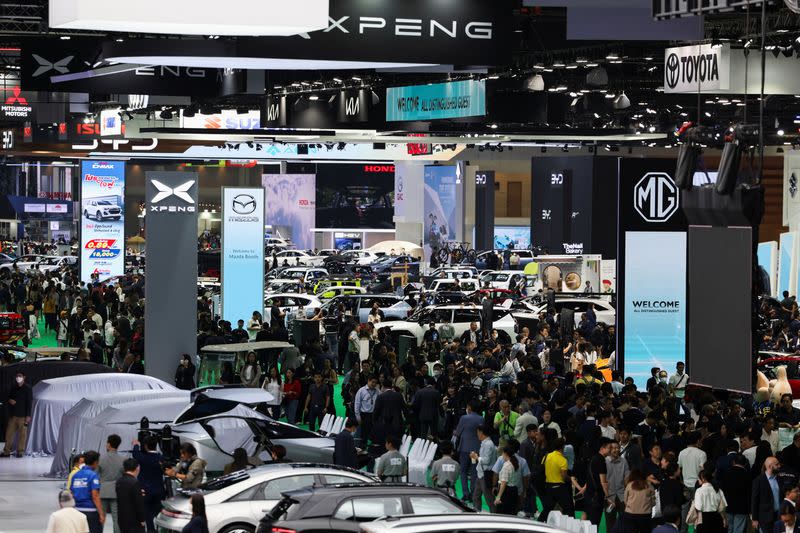Thailand has been discussing a trade-in and scrapping scheme with carmakers in a ploy to reinvigorate a sector hit by its biggest crisis in decades.
Industry officials and other sources say the move comes as output in the Southeast Asian auto hub has plunged for more than a year and is now stuck with a flood of new Chinese EVs.
The car sector has been rocked by a slowdown in exports and weak domestic sales, while tighter credit at a time of soaring household debt has undermined people’s capacity by buy vehicles.
ALSO SEE: Trump’s Steel Tariff to Hit Chinese Supply Lines via Other Nations
“Japanese automotive companies, including Toyota, have been continuously discussing ‘End of Life Vehicle schemes’ under the initiatives and direction of Thai Government to reduce aged vehicles which have a tendency to have higher emissions,” Toyota’s Thai unit said in a statement to Reuters.
“The framework and mechanism are being discussed among industry, government and academia,” it added.
The discussions are in early stages and have not previously been reported. The scheme would see consumers trade in old vehicles in exchange for a discount on their next vehicle purchase, with traded-in vehicles scrapped, the officials said.
“Car makers are pushing hard for this because they want to sell cars,” Sompol Tanadumrongsak, president of the Thai Auto-Parts Manufacturers Association, told Reuters, adding that a 10-year age threshold was being considered for scrapped vehicles.
The association is among industry groups that holds monthly meetings with government agencies, including the investment board and the industry ministry.
Officials at Thailand’s industry ministry did not respond to telephone calls from Reuters to seek comment, however.
Slump in auto production
Auto production in Thailand fell a tenth last year to a four-year low, with domestic sales and exports falling 26% and 8.8%, respectively. Production fell in January for an 18th consecutive month, plunging more than 24% on a yearly basis.
The industry, which accounts for 10% of GDP, wants to revive sales amid a sluggish economy and disruption caused by Chinese EV makers such as BYD and Great Wall Motors which have poured more than $3 billion into facilities in Thailand.
Those factories are pumping out new cars and slashing prices, challenging the dominance of Japanese auto makers such as Toyota and Honda, making a trade-in scheme more attractive for buyers.
“There have been discussions about the measure but it has not been finalised yet,” said Surapong Paisitpattanapong, a spokesperson for the automotive division of the Federation of Thai Industries, which sprawls across 47 sectors.
“One reason is because it involves many agencies.”
Toyota ‘pushing for end-of-life car scheme’
Another aspect of the talks considered the age of cars to be scrapped, said a government source, who sought anonymity.
“There will be good news soon,” added the source. “We have discussed the details. There has been discussion about the end of life of the cars.”
Toyota, the market leader in Thailand, which has long supplied the bulk of the country’s taxis, is pushing hard for the car scrapping proposal, added the government source and a person in the auto industry familiar with the matter, who also sought anonymity as the issue is a sensitive one.
“Toyota stands to benefit through their scrapping subsidiary, Green Metals,” said the industry source, adding that issues from financing to recycling infrastructure and management still needed to be hammered out.
The industry ministry and Toyota held meetings last week on ways to stimulate the Thai auto sector, the government said in a statement, but did not mention a scrapping scheme.
“There is a proposal from the Federation of Thai Industries and the private sector, but it has not reached the finance ministry yet,” Kulaya Tantitemit, head of the excise department, which oversees taxes, said.
Early discussions put the burden of funding and managing the scrapping scheme on the auto companies, said Sompol, adding that sellers of new cars were envisaged to be responsible for managing the scrap.
A car scrapping scheme for old cars to be phased out would create new investments and jobs in Thailand, as it has few auto recycling plants such as that owned by Toyota, said Suwit Chobpradu, vice president of Thailand’s Used Car Association.
“This would stimulate the market more than any policy,” he added.
- Reuters with additional input and editing by Jim Pollard
ALSO SEE:
Japanese Carmakers Want Government Help to Negate US Tariffs
Thailand Facing EV Price War After Flurry of Chinese Investment
Spending on Global Energy Transition Well Under What’s Needed
TikTok to Invest $3.8 Billion in Data Centre in Thailand
BYD ‘to Complete $1-Billion EV Factory in Indonesia by Year-End’
China’s CATL Feels the Pinch of a Lithium Price Slump it Created
China’s BYD Opens Its First EV Plant in Southeast Asia
























